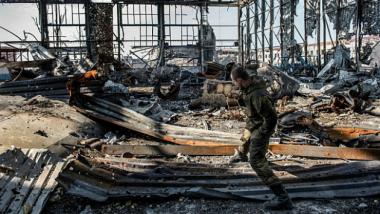Music Transcends War
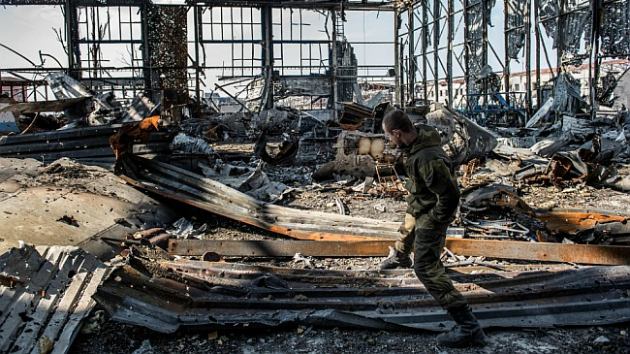
In Donetsk, the war-torn city where Ukrainian government troops and Moscow-supported separatists have been clashing for months, the Sergei Prokofiev International Airport is in ruins, destroyed by bombs and artillery.
The composer was born in 1891 in Dnipropetrovsk, when it was the major city of the Russian Empire's Ekaterinoslav Governorate.
Last week, there was startling, difficult-to-comprehend news from Donetsk:
Despite power cuts, a business shutdown, curfews, and near daily shelling, residents of the rebel-held city flock to the Donetsk Opera and Ballet Theater on weekends in search of respite from the reality of life within a conflict zone.
"It has not been easy," Igor Ivanov, the theater's deputy director, told VICE News after the performance. "It's difficult for people to pay because the banks are down, and we have to stage our performances during the daytime."
... Roughly a third of the theater's performers fled when war broke out, including key singers and all four of its conductors. A further setback occurred when a wayward missile destroyed the warehouse where it stored most of its stage sets.
Recently in Donetsk in April:Boheme, and Carmen, and recently Trovatore. The rebel leaders are said to pay for their fighters to attend the opera on breaks from the front line.
The story reminds me of what happened 23 years ago, during the siege of Sarajevo, when performing arts gave people in deadly jeopardy the same diversion and encouragement.
Our traffic and parking problems on the way to a performance seem so insignificant in comparison. By the way, in addition to Donetsk, there are at least 10 other airports named after composers, such as Salzburg's Mozart, Budapest's Franz Liszt, and Liverpool's John Lennon international airports.
Ravel in Redwood City
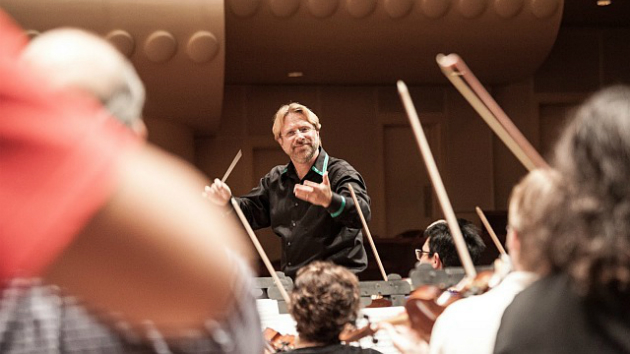
Redwood Symphony Music Director Eric Kujawsky is venturing again into unusual territory for a regional orchestra, presenting Ravel's L'enfant et les sortileges (The Child and the Spells) on the next concert, May 16 at Cañada College.
Kujawsky, who has taken his all-volunteer orchestra through Mahler cycles, premieres, contemporary works, Davies Hall presentations of the Berlioz Requiem, and Stravinsky's Oedipus Rex, now mobilizes Bay Shore Lyric Opera and Masterworks Chorale's Serenade to offer Ravel's 1925 work.
"It sounds like a variation on Toy Story, Kujawsky says, "but it came decades before the Pixar version. A young boy, who has always mistreated his toys, pets, and even the plants and animals outside the house, finds himself the object of their revenge.
"The audience will meet a very funny collection of characters, including a pair of meowing cats, and hear arias for a teacup and a sofa — with interpolations of jazz and even Puccini. It will be presented with supertitles."
Soloists include Liliane Cromer (Child), Rachel Warner (Mother), Jenny Studley (Fire, Princess), and Diane Squires (Female Cat, Shepherdess, Nightingale, Squirrel).
Also on the program: a prominent, former Redwood Symphony member, Robert Marcus, returning to perform Brahms' first clarinet sonata, orchestrated by Luciano Berio. The conductor calls the work "the clarinet concerto that Brahms never got around to writing."
The orchestra will conclude its 30th anniversary season on July 25 with “Rites: Stravinsky and Orff,” performing The Rite of Spring and Carmina Burana.
ABS Mass in B Minor on Youtube
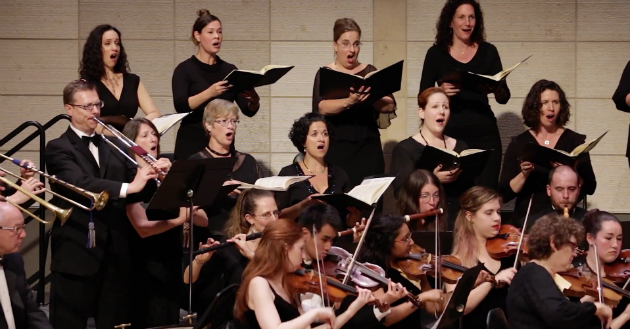
American Bach Soloists' coveted annual performance of Bach's Mass in B Minor is the subject of a 30-minute documentary on YouTube, complete with generous excerpts.
The concert footage is from last year's ABS Festival & Academy. ABS Music Director Jeffrey Thomas conducts the ABS Festival Orchestra, American Bach Choir, with instrumental and vocal soloists from the ABS Academy.
Musicians interviewed in the documentary include Thomas, soprano Tonia D’Amelio, alto James Apgar, and bass John Kendall Bailey; instrumentalists Elizabeth Blumenstock, Debra Nagy, John Thiessen, Steven Lehning, Sandra Miller, and Salwa Bachar.
Mass excerpts are from the “Kyrie eleison,” with mezzo-soprano Janna Elisia Critz and soprano Fiona Gillespie; Laudamus te, with mezzo-soprano Agnes Vojtko and violinist Augusta McCay Lodge; “Et in Spiritum Sanctum Dominum,” with baritone Randall John Bunnell and oboists Joel Verkaik and Bethan White; “Sanctus,” with trumpeter John Thiessen; “Benedictus,” with tenor Mark Bonney and flutist Kelly Roudabush.
Thomas says of the work, which he has led many times:
Bach accepted his world and found no need to dismiss or look beyond the methodologies for the creation of art or the answers to life’s most difficult questions that were provided by his culture, by his religion, and by his ancestry. Rather, he sought to perfect all of those ideals and solutions in a way that further glorified what he saw as the ideal expression of life’s meaning and purpose.
Dancing Away the Hours in the Pit
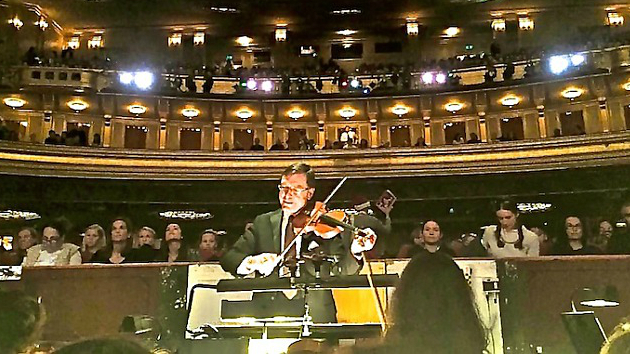
While the hardworking dancers on stage at San Francisco Ballet's season-closing Romeo & Juliet make it look effortless, the Ballet Orchestra labors invisibly in the pit. They should really be able to take a bow for a tough weekend, perhaps a record-breaker.
Prokofiev's score runs two and a half hours (or longer under certain conductors), and the same orchestra played it five times in 48 hours! That's a weekend of about 13 hours of music-making, plus hours of preparation, driving, parking, etc. Conductors alternated (Martin West and Ming Luke), but the same musicians soldiered on twice on Friday, twice on Saturday, and at the Sunday matinee.
Not only did they perform this remarkable marathon, but they did so with distinction. At the Saturday matinee that I saw (and heard), under Luke's baton, there were remarkable solos by David Henderson (saxophone), Anna Kruger (viola), Barbara Chaffe (flute), Steve D'Amico (double bass), and Rufus Olivier (bassoon). As tryouts continue for Roy Malan’s successor as concertmaster, candidate Cordula Merks, Seattle Symphony's assistant concertmaster, made a big impression, her stamina well-tested.

